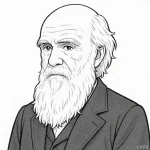“Some people would claim that things like love, joy and beauty belong to a different category from science and can’t be described in scientific terms, but I think they can now be explained by the theory of evolution.”

- January 8, 1942 – March 14, 2018
- British
- Theoretical physicist, science writer
table of contents
Quote
“Some people would claim that things like love, joy and beauty belong to a different category from science and can’t be described in scientific terms, but I think they can now be explained by the theory of evolution.”
Explanation
In this quote, Stephen Hawking addresses the often-posed separation between the realms of science and human experience—specifically emotions like love, joy, and beauty. Traditionally, these concepts have been regarded as beyond the scope of scientific explanation, often associated with philosophy, art, or religion. Many have argued that emotions and aesthetic experiences are subjective and cannot be reduced to scientific terms, which tend to focus on objective data and measurable phenomena. However, Hawking challenges this view by suggesting that evolutionary theory can provide a scientific framework for understanding these aspects of human experience.
According to evolutionary biology, traits and behaviors that seem to transcend pure survival—like love, joy, and beauty—can be understood as evolved mechanisms that serve particular functions in the context of human survival and reproduction. For example, love and attachment can be seen as adaptive behaviors that promote pair bonding and the care of offspring, ensuring the continuation of the species. Similarly, aesthetic preferences for beauty may have evolved because traits like symmetry or color are associated with health, fertility, or resource abundance, making them appealing in the context of mate selection. Joy and pleasure, too, are often tied to reward systems in the brain that motivate behaviors essential for survival, such as eating or social bonding.
Hawking’s perspective reflects a broader shift in scientific thinking, where the human experience—often seen as purely emotional or artistic—can now be analyzed through the lens of biology, psychology, and evolutionary theory. This approach does not diminish the value or complexity of emotions, but it offers a way to connect them to the broader biological and neurochemical processes that shape human behavior. It suggests that, far from being separate from the natural world, experiences like love, beauty, and joy are deeply intertwined with evolutionary forces that have shaped the human species over millennia. This view not only deepens our understanding of human nature but also opens up the possibility of a more integrated view of the world, where science and subjective experience are not at odds but are part of the same intricate tapestry of existence.
Would you like to share your impressions or related stories about this quote in the comments section?




